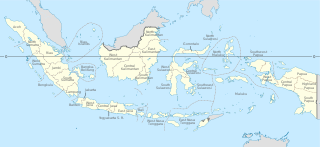
Provinces are the first-level administrative divisions of Indonesia. It is formerly called the first-level provincial region before the Reform era. Provinces have a local government, consisting of a governor and a regional legislative body. The governor and members of local representative bodies are elected by popular vote for five-year terms, but governors can only serve for two terms. Provincial governments have the authority to regulate and manage their own government affairs, subject to the limits of the central government. The average land area of all 38 provinces in Indonesia is about 49,800 km2 (19,200 sq mi), and they had an average population in mid 2023 of 7,334,111 people.

The following table indicates declared Indonesian government national holidays. Cultural variants also provide opportunity for holidays tied to local events. Beside official holidays, there are the so-called "libur bersama" or "cuti bersama", or joint leave(s) declared nationwide by the government. In total there are 16 public holidays every year.

The State Intelligence Agency, commonly referred to as BIN, is Indonesia's primary intelligence agency. The BIN is also responsible for coordinating intelligence activities among various intelligence agencies, including military intelligence, police intelligence, prosecutors intelligence and other relevant entities.
STAN Polytechnic of State Finance, is a government-affiliated college in Indonesia, located in Banten, in Bintaro Sector V Tangerang Selatan. It offers undergraduate degrees in finance. The curriculum is focused on public finance, with an emphasis on government policy and regulation. Upon completion of their study, PKN STAN graduates serve in government institutions in Indonesia especially in the Ministry of Finance of the Republic of Indonesia. The current PKN STAN director is Evy Mulyani, Ak., M.B.A., Ph.D. CA, CACP, CRGP.

The cinema of Indonesia refers to films produced domestically in Indonesia. The statutory Indonesian Film Board, or BPI, defines Indonesian films as "movies that are made by or using Indonesian resources whose Intellectual Property Right is owned either entirely or partly by Indonesian citizen or Indonesian legal entity".

Azyumardi Azra was an Indonesian public intellectual, Muslim scholar and Rector of Syarif Hidayatullah State Islamic University Jakarta. He graduated from Department of History, Columbia University in 1992. He was known as a prolific books writer; member of advisory board of a number of international organizations such as UN Democracy Fund (UNDEF), International Institute for Democracy and Electoral Assistance. After serving as Rector at Syarif Hidayatullah State Islamic University Jakarta, he was the Director of Graduate School.

Awards and decorations of the Republic of Indonesia are both military and civilian awards for service and personal contributions to the Republic of Indonesia. According to the Constitution of Indonesia, Chapter III Article 15: "The President grants titles, decorations and other honors as regulated by Law".

West Nias Regency is a regency in North Sumatra province of Indonesia. The regency seat is located in the Lahomi district. It covers the western portion of Nias Island. The regency covers an area of 520.34 km2, and had a population of 81,807 at the 2010 census and 89,994 at the 2020 census; the official estimate as at mid 2023 was 95,334. This regency was created on 29 October 2008 by Law Number 46 of 2008 from districts which had previously been part of Nias Regency.
The National Standardization Agency of Indonesia is the International Organization for Standardization (ISO) member body for Indonesia. BSN is a non-ministerial Indonesian government agency with the main task of carrying out governmental tasks in the field of standardization and conformity assessment in Indonesia. The agency is also responsible to develop and maintain the Indonesian National Standard.

The Ministry of State Secretariat is a government ministry responsible for providing technical, administrative, and analytical support to the President and Vice President in the exercise of their state powers. The current minister of the state secretariat is Prasetyo Hadi who previously served as a member of House of Representatives and replaced Pratikno under Prabowo's administration.

The Attorney General's Office of the Republic of Indonesia is the competent authority to advise the Government of Indonesia on matters of law. It serves as the central organization for the Indonesian Public Prosecution Service. The Attorney General's Office is seated in the national capital Jakarta.

The Ministry of National Development Planning/National Development Planning Agency is a ministry of the Republic of Indonesia that has the task to oversee government affairs in the field of national development planning to assist the President in organizing state government. The minister is responsible to the President. The Ministry of National Development Planning uses organizational units and resources within the National Development Planning Agency.

The National Research and Innovation Agency is a cabinet-level government agency formed by the Indonesian government in 2019. Originally a new agency attached to the Ministry of Research and Technology, which became the Ministry of Research and Technology/National Research and Innovation Agency, the agency was controversially separated and established as a new non-ministerial government agency directly under the President of Indonesia on 28 April 2021. On 23 August 2021, the agency gained cabinet-level status through enactment of Presidential Decree No. 78/2021. Under the new presidential regulation, the agency became the sole national research agency of Indonesia.

National Cyber and Crypto Agency, is Indonesia's primary signal intelligence agency, as well as cyber intelligence, cyber threat intelligence, cyber defense, and cyber security agency.

The Pancasila Ideology Development Agency is a non-ministerial government agency formed by the Indonesian government in 2018 with Presidential Decree No.7/2018. The agency was tasked with the main task of preserving Pancasila, the state ideology, and its ideological development and implementation. It is the revitalisation of Presidential Unit of Pancasila Ideology Development formed in 2017.

Nusantara Capital City Authority is a cabinet level-agency formed by the Indonesian government, working directly under the President of Indonesia. The agency will become a special agency tasked with managing and governing the city of Nusantara, future capital of Indonesia located on Kalimantan.

The Indonesia Investment Coordinating Board was until 2021 a Non-Ministerial Government Body in Indonesia for formulation of government policies in the field of investment, both domestically and abroad. Since 2021, it was elevated into a ministry, the Ministry of Investment.
Non-structural institutions or non-structural agencies are special organizations in Indonesia distinct from traditional government ministries and non-ministerial government bodies. Formed through certain legislative and executive acts, non-structural institutions are formed to support the overall functions of the state and government, addressing specific needs/tasks that cannot be as efficiently handled by existing ministries and agencies. Funding for these organizations come from the national budget (APBN).

The National Border Management Agency is an Indonesian government agency established in 2010 under Presidential Regulation No. 12, in accordance with the mandate of Law No. 43 of 2008 concerning State Territory. It is the government agency in Indonesia in charge of overseeing and coordinating border management efforts, developing policies that protect the country's vast borders, both land and maritime. However, the BNPP's authority is limited to budget planning, policy coordination, and evaluation duties rather than direct enforcement. It is directly accountable to the president of Indonesia. Its operational expenses are entirely covered by the state budget.
















